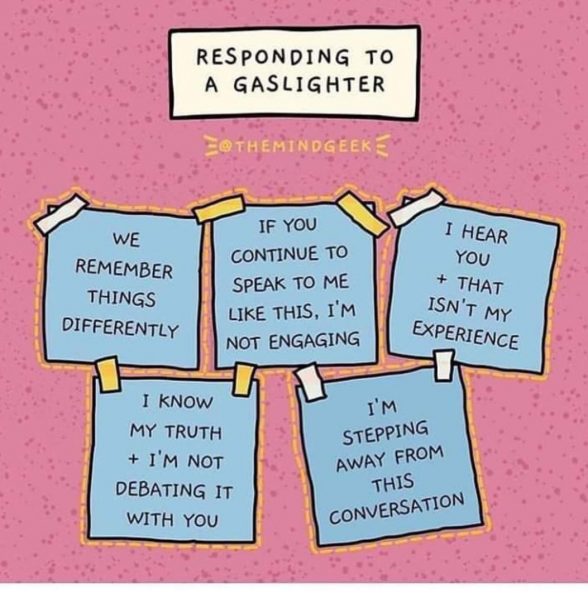
The exaggerated sense of self is the first sign that you might be dealing with a narcissist. Not to be confused with self-love, a narcissist believes that the only way to be at the centre of the room is to look down on others.
This, the narcissist wields with so much manipulative power such that before the victim finds out, the damage may have been done. And the effects of narcissism run deep.
While there are a lot of articles that focus on narcissistic behaviour, not many looks at the long-term effects on the victim.
Now, let’s delve into gaslighting. Easily serving as a trigger, this covert form of narcissism is one of the worse forms of manipulations.
A gaslighter is a master manipulator who knows how to use your emotions as a weapon to deflate their behaviour. With a flick, a gaslighter flips the script.
[ad]
In fact, a gaslighter can make you doubt yourself and your sense of reason so that you might start to think you are crazy and just illusioned. A gaslighter intends to leave you apologetic, make you give excuses for their behaviour, and unhappy.
And oh, they are everywhere. Gaslighting includes lying, blame-game, disrespect, refusal to admit mistakes, tearing another down. #
Besides the now popular thought of craziness, it can also appear in other forms. Here are some you may not be aware of.
1. The word “sensitive” should not be joked with. But a narcissist doesn’t understand this. So when you point out how their actions or statement has hurt you, all you will get is a statement revolving around being “too sensitive”. When someone refuses to understand how it hurts you, you have been subject to subtle gaslighting. This person is clearly saying that they do not respect boundaries.
2. Blame-shift: Pointing out how something hurts you might only end up in “I don’t see what I have done wrong.” The admission of guilt is far from a gaslighter. The onus is on the victim to take whatever comes because the gaslighter does not really see the point in the issue being raised. Sometimes, there are self-righteous excuses ready before your concerns are raised. And if you attempt to address the issue, that is yours to solve because they are uninterested and want you to sweep it under the carpet. Take care that you are not speaking to a gaslighter.
3. Question your thought process: “Clearly, you are the only one whose thought process is faulty” is what it looks like they are telling you. This can put anyone on the edge and into silence. All that is left is you questioning your ideologies and walking on eggshells.
[ad]
Trauma Bond
When a cycle of abuse is repeated over time, it is easy to develop a trauma bond with a narcissist. Stories abound of people whose abusive partners have placed them in a death-threatening position, yet return to their abuser despite attempts from family and friends to cut ties.
The saying, “the devil you know is not better than the angel you do not know” holds with the victim. This comparison has made some afraid to explore their chances of experiencing kindness in itself. Because the victim has been manipulated long enough, this person believes that this is the only way the perpetrator or anyone knows how to show love and “accepts” them for who they are.
Admittedly, trauma bonds are difficult to break. With the constant subject to devaluation, the victim has become totally dependent on the validation of their abuser, sometimes feeling guilty and responsible for the perpetrator. The solution to this is to no contact with the perpetrator. It may take time to get over the bond, but healing is never rushed.
When healing takes place, there are other factors that the survivor now has to deal with.
Survivors sometimes do not realise how much their psychology has been affected such that during the process of healing, there is an instant withdrawal or mistrust when someone treats them nicely.
It is not unusual to have PTSD from the experience the survivor has had. It is this fear that drives quite a number of survivors into staying away from relationships. Triggers could come in the form of something as simple as a touch or a statement. During these triggers, the abused feels threatened or in danger.
This is where self-esteem comes into play. Whatever you do, always know that you hold the key to your sanity. Don’t let anyone take that from you.
Refuse to be a doormat to someone who isn’t willing to change their toxic behaviour but wants you to be accepting of it and stay. How? Start with daily affirmations that remind you of your worth.
This will strengthen your resolve. It is best to seek the help of a psychologist doesn’t because you deserve peace of mind and happiness.
[ad unit=2]








